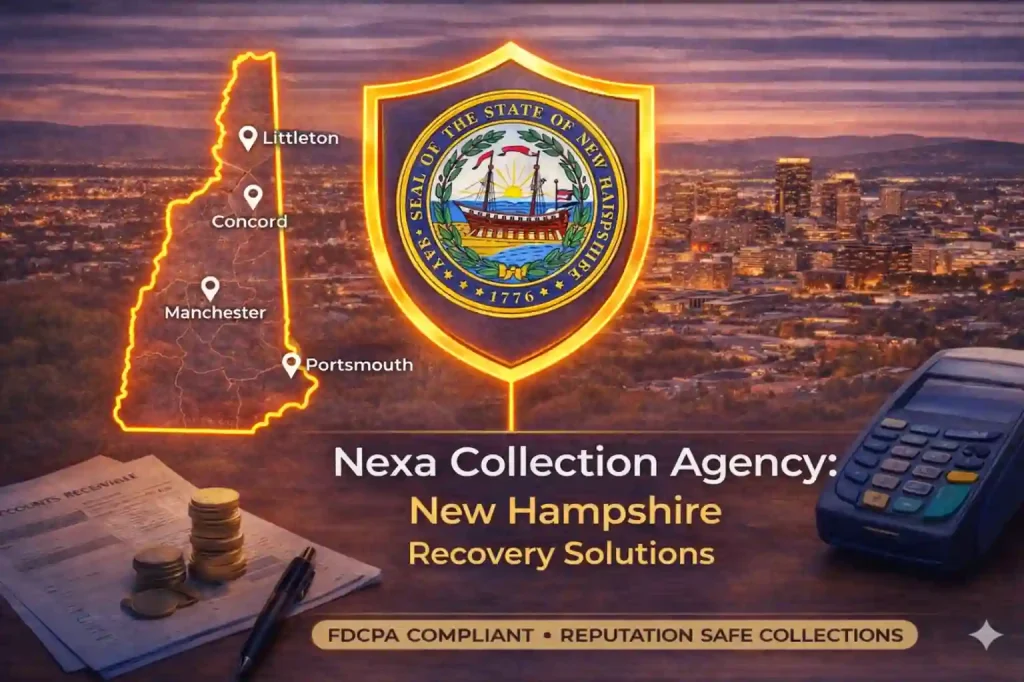In New Hampshire—from the tech hubs of Manchester and the historic mills of Nashua to the healthcare corridors of Concord and Lebanon—business is built on local reputation. But in 2026, being “neighborly” doesn’t mean letting your cash flow dry up. With the 3-year statute of limitations (RSA 508:4) looming over medical and open accounts, waiting to collect isn’t just a delay—it’s a forfeiture of your legal rights. You don’t just need a collector; you need a New Hampshire-compliant partner who knows how to utilize the 20-year specialty window for B2B contracts while staying 100% clear of RSA 358-C penalties.
Nexa provides 100% reputation-safe, equipped with all 50-state collections license, offering free credit reporting, free litigation/bankruptcy scrubs, and zero onboarding fees. Secure – SOC 2 Type II & HIPAA compliant.
Need a Collection Agency? Contact us
The New Hampshire Legal Landscape
New Hampshire is a state of extremes. You either have a very short window or a very long one. We ensure you never miss a deadline.
| Debt Category | Statute of Limitations | NH Statute (RSA) |
| Written Contracts (Specialties) | 20 Years | RSA 508:5 |
| Oral / Open Accounts | 3 Years | RSA 508:4 |
| Medical Debt | 3 Years | RSA 358-C Compliance |
| Wage Garnishment | ALLOWED (25% Cap) | RSA 161-C:22 |
| Judgments | 20 Years | RSA 508:5 |
Critical New Hampshire Rules for 2026:
-
The 3-Year “Drop-Off”: For medical bills and open B2B invoices, NH law is strict. If you don’t file suit within 3 years, the debt becomes “time-barred.” Nexa’s high-speed “Step 1” demand service is designed to trigger payment before this cliff.
-
The 20-Year “Super-Window”: Under RSA 508:5, certain written contracts (specialties) stay alive for 20 years. Nexa audits your old ledgers to find “zombie debt” from the last decade that is still legally collectable.
-
The $450/Week “Safe Zone”: In 2026, creditors must respect federal and state wage floors. We identify high-earning debtors to ensure your legal spend results in actual checks, not empty court orders.
-
RSA 358-C Compliance: New Hampshire’s local version of the FDCPA is aggressive. Even original creditors can be sued for “unfair” collection. Nexa acts as your compliance shield, ensuring every call and letter is by the book.
Cost-Effectiveness: The Nexa Advantage
-
Fixed-Fee Recovery ($15/account): Ideal for early-stage receivables. Debtors pay 100% directly to you. No commissions.
-
Contingency Service (20%–40%): Performance-based recovery. No Recovery, No Fee.
Industries We Serve in New Hampshire
-
Manufacturing & Logistics: B2B recovery for the Nashua and Seacoast industrial sectors. We handle high-value freight brokerage and warehousing disputes with a focus on RSA 447 (Mechanic’s Liens).
-
Healthcare & Medical: 100% HIPAA-compliant. We manage patient balances for practices in Concord and Lebanon, navigating the 3-year statute with mediation that protects patient-provider trust.
-
Colleges & Universities: From the Ivy League to local community colleges, we handle tuition fee recovery and bursar accounts, balancing firm tactics with institutional reputation.
-
K-12 Private & Charter Schools: Managing unpaid enrollment fees and textbook costs. We offer a sensitive, diplomatic approach tailored for New Hampshire’s independent school culture.
-
Accountants & CPA Firms: Recovery of professional service fees. We understand the “net-30” billing cycle and use professional mediation to ensure you get paid without damaging client rapport.
-
Banks & Credit Unions: Expert handling of delinquent consumer loans and deficiency balances using New Hampshire’s aggressive 20-year judgment renewal window.
-
Construction & Trades: Revenue recovery for HVAC, electrical, and general contractors. We are experts in RSA 447 and the strict 120-day lien recording deadlines.
-
B2B Commercial, Restoration & Waste Management: High-speed recovery for service providers who need cash flow restored to manage the seasonal operational costs of the Granite State.
Recent New Hampshire Recovery Results
Case 1: Manchester-Area Medical Practice (Medical)
-
The Problem: $95,000 in aging patient debt approaching the 3-year statute limit.
-
The Result: Nexa implemented a high-speed mediation strategy, recovering $68,000 in 55 days before the accounts became legally uncollectible.
Case 2: Seacoast Logistics Company (B2B)
-
The Problem: A $42,000 unpaid freight invoice from a vendor who stopped responding during a regional merger.
-
The Result: By utilizing the 20-year specialty statute and a formal pre-legal demand, Nexa secured a full $42,000 recovery plus interest in just 24 days.
Frequently Asked Questions (FAQ)
1. Is it true I only have 3 years to collect in New Hampshire?
For most “open accounts” (like medical bills and standard invoices), yes. This is why we recommend moving accounts to Nexa after 60–90 days of non-payment. However, signed written contracts may qualify for the 20-year window.
2. Can you still garnish wages in New Hampshire in 2026?
Yes. Following a court order, we can garnish up to 25% of disposable income, provided the debtor earns above the protected minimum wage floor (currently ~$450/week).
3. Does Nexa handle the 2026 medical reporting changes?
Yes. Our systems are updated for the latest federal and state restrictions, shifting our focus to legal judgments and bank levies to ensure your clinic is not left with unpaid balances.
Popular Cities

